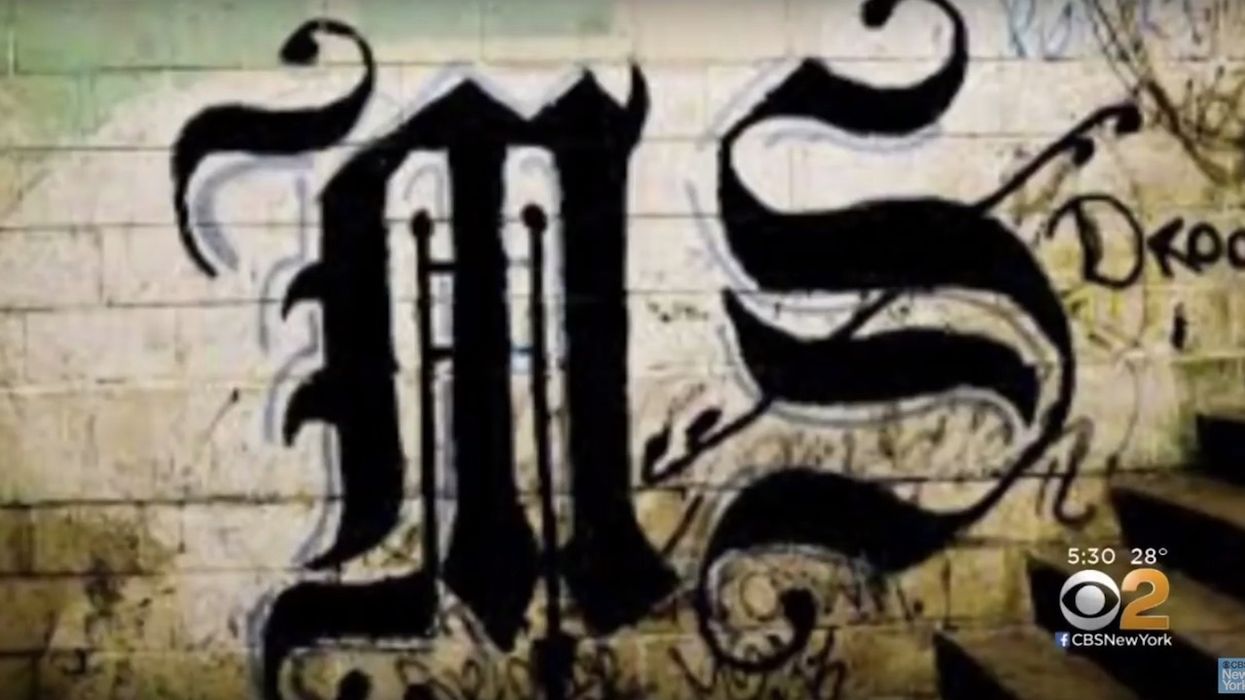
Image source: YouTube screenshot

'We know they are going to come for us'
The murderous MS-13 gang of El Salvador — which has long since infiltrated the United States and recently threatened to kill Long Island, New York, cops in their homes — are far too dangerous for many police in their home country.
In fact, the Washington Post reported, numerous El Salvador cops have fled the country in fear of MS-13 — and after being paid by the U.S and trained by FBI agents to take down the outfit.
Thing is, the paper said, Salvadoran police have been killed "by the dozens" over the last three years — and nine alone in January.
More from the Post:
There is no list in either El Salvador or the United States of Salvadoran police officers who have fled the country. But The Washington Post has identified 15 officers in the process of being resettled as refugees by the United Nations and six officers who have either recently received asylum or have scheduled asylum hearings in U.S. immigration courts. In WhatsApp groups, police officers have begun discussing the possibility of a migrant caravan composed entirely of Salvadoran police — a caravana policial, the officers call it.
The exodus of Salvadoran police points to how the country's security forces have failed to break the stranglehold of organized crime. It also shows that among those seeking refuge in the United States during the Trump administration are some of America's closest security partners.
"These are among the most vulnerable people in El Salvador," Julio Buendía — director of migration at Cáritas El Salvador, a nonprofit that works with the U.S. and United Nations on refugee resettlement — told the paper.
The State Department spent at least $48 million to train police in El Salvador, Guatemala, and Honduras from 2014 through 2017, the Post said, citing the Government Accountability Office.
At a law enforcement training academy in San Salvador, the FBI and other American policing agencies trained 855 Salvadoran officers during those four years, the paper added.
El Salvador's murder rate has been dropping: It was 81 per 100,000 inhabitants in 2016, 60.8 per 100,000 in 2017, and 50.3 per 100,000 inhabitants last year, the Post said.
But that metric wasn't enough to keep some El Salvador officers in the fight.
More from the paper:
With salaries of $300 to $400 per month, the low-level police officers who make up the majority of the force often have no choice but to live in neighborhoods vulnerable to gangs. And so, in the vast majority of the cases, police officers are killed when they are home from work or are on leave.
In August, Manuel de Jesús Mira Díaz was killed while buying construction materials. In July, Juan de JesúsMorales Alvarado was killed while walking with his 7-year-old son on the way to school. In November, Barrera Mayén was killed after taking leave to spend time at home with his family.
The police investigated a number of the killings since 2014 and found members of the major gangs responsible.
"They have more control than we do. When we go home, we're in neighborhoods where there's one police to 100 gang members. We're easy victims," one officer in the anti-gang unit told the Post on the condition of anonymity over safety fears. He added to the paper that MS-13 threatened him in his home, and he's awaiting refugee status from the United Nations.
The State Department, citing "privacy concerns," wouldn't comment on whether it was receiving asylum or refugee applications from Salvadoran police officers, the Post said.
The law prevents Salvadoran police from taking their weapons home with them, the paper said.
"I bring it home anyway. I sleep with it on my waist," a female officer told the Post on the condition of anonymity for fear of her safety, adding that she's awaiting refugee status from the UN. "My husband and I take turns sleeping. We know they are going to come for us."
In addition, many units are forbidden to wear ski masks to conceal their identities, the paper said. While officers in anti-gang units are allowed to wear such masks during operations, the Post said they can't do so in court, where they must show their faces as gang members watch.
A 2017 Salvadorian "protection law" for cops and soldiers that would also provide funding to protect their families never passed Parliament, the paper said, adding that this year, El Salvador's police chief said officers weren't allowed to return to the homes for their own protection. The chief denied multiple interview requests, the Post noted.
Many officers — due to feeling unprotected by their own force — are saying their only choice is to leave the country, the paper said.
More from the Post:
Organizations that work with the United Nations to resettle Salvadoran refugees in the United States say they have found more and more police officers arriving unannounced at their offices. In addition to the 21 asylum seekers and refugees identified by The Post, several others have recently arrived in Spain and Mexico, according to news reports, applying for humanitarian visas or other forms of protection. Lawyers for police officers and many officers themselves say that far more officers are preparing to flee.
One of the cases that Buendía, the migration director of Cáritas, referred to the United Nations High Commissioner for Refugees is an officer who survived two attacks while off duty. First, he was shot eight times by suspected gang members; then, two years later, he was shot four times. The officer pleaded for protection from his commander.
Buendía included a letter from the commander in the officer's refugee application. "There's nothing we can do for you," the commander wrote. "You need to protect yourself."
A police spokesman declined to comment on the letter.
Here's a report on MS-13 threatening Long Island, New York, police in their own homes: